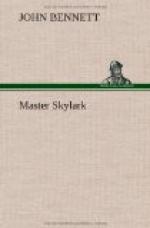Then they were gone behind the curtain, into the shadow and the twilight there, Colley with his arms about Nick’s neck, not quite laughing, not quite sobbing. The manuscript of the Revel lay torn in two upon the floor, and Master Gyles had a foot upon each piece.
In the hall beyond the curtain was a silence that was deeper than a hush, a stillness rising from the hearts of men.
Then Elizabeth turned in the chair where she sat. Her eyes were as bright as a blaze. And out of the sides of her eyes she looked at the Venetian ambassador. He was sitting far out on the edge of his chair, and his lips had fallen apart. She laughed to herself. “It is a good song, signor,” said she, and those about her started at the sound of her voice. “Chi tace confessa—it is so! There are no songs like English songs—there is no spring like an English spring—there is no land like England, my England!” She clapped her hands. “I will speak with those lads,” said she.
Straightway certain pages ran through the press and came behind the curtain where Nick and Colley stood together, still trembling with the music not yet gone out of them, and brought them through the hall to where the Queen sat, every one whispering, “Look!” as they passed.
On the dais they knelt together, bowing, side by side. Elizabeth, with a kindly smile, leaning a little forward, raised them with her slender hand. “Stand, dear lads,” said she, heartily. “Be lifted up by thine own singing, as our hearts have been uplifted by thy song. And name me the price of that same song—’twas sweeter than the sweetest song we ever heard before.”
“Or ever shall hear again,” said the Venetian ambassador, under his breath, rubbing his forehead as if just wakening out of a dream.
“Come,” said Elizabeth, tapping Colley’s cheek with her fan, “what wilt thou have of me, fair maid?”
Colley turned red, then very pale. “That I may stay in the palace forever and sing for your Majesty,” said he. His fingers shivered in Nick’s.
“Now that is right prettily asked,” she cried, and was well pleased. “Thou shalt indeed stay for a singing page in our household—a voice and a face like thine are merry things upon a rainy Monday. And thou, Master Lark,” said she, fanning the hair back from Nick’s forehead with her perfumed fan—“thou that comest up out of the field with a song like the angels sing—what wilt thou have: that thou mayst sing in our choir and play on the lute for us?”
Nick looked up at the torches on the wall, drawing a deep, long breath. When he looked down again his eyes were dazzled and he could not see the Queen.
“What wilt thou have?” he heard her ask.
“Let me go home,” said he.
There were red and green spots in the air. He tried to count them, since he could see nothing else, and everything was very still; but they all ran into one purple spot which came and went like a firefly’s glow, and in the middle of the purple spot he saw the Queen’s face coming and going.




